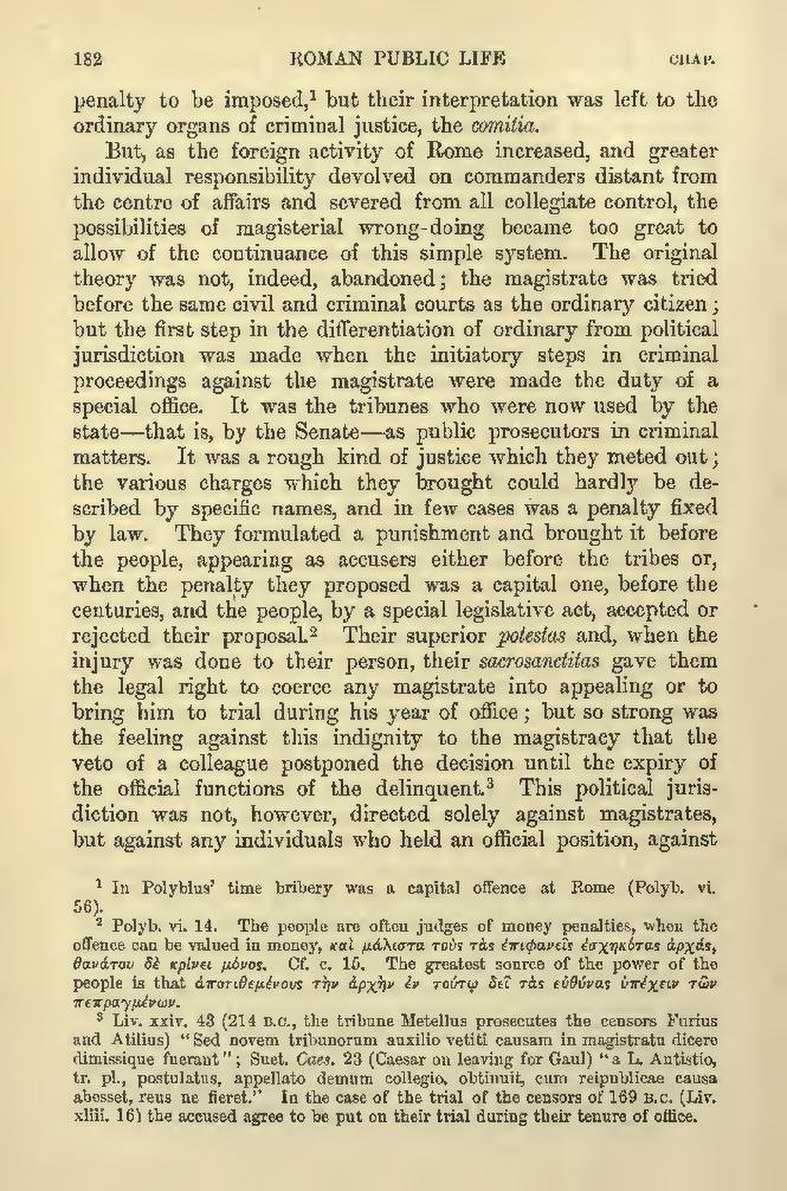penalty to be imposed,[1] but their interpretation was left to the ordinary organs of criminal justice, the comitia.
But, as the foreign activity of Rome increased, and greater individual responsibility devolved on commanders distant from the centre of affairs and severed from all collegiate control, the possibilities of magisterial wrong-doing became too great to allow of the continuance of this simple system. The original theory was not, indeed, abandoned; the magistrate was tried before the same civil and criminal courts as the ordinary citizen; but the first step in the differentiation of ordinary from political jurisdiction was made when the initiatory steps in criminal proceedings against the magistrate were made the duty of a special office. It was the tribunes who were now used by the state—that is, by the Senate—as public prosecutors in criminal matters. It was a rough kind of justice which they meted out; the various charges which they brought could hardly be described by specific names, and in few cases was a penalty fixed by law. They formulated a punishment and brought it before the people, appearing as accusers either before the tribes or, when the penalty they proposed was a capital one, before the centuries, and the people, by a special legislative act, accepted or rejected their proposal.[2] Their superior potestas and, when the injury was done to their person, their sacrosanctitas gave them the legal right to coerce any magistrate into appealing or to bring him to trial during his year of office; but so strong was the feeling against this indignity to the magistracy that the veto of a colleague postponed the decision until the expiry of the official functions of the delinquent.[3] This political jurisdiction was not, however, directed solely against magistrates, but against any individuals who held an official position, againstCf. c. 15. The greatest source of the power of the people is that [Greek: apotithemenous tên archên en toutô dei tas euthynas hypechein tôn pepragmenôn].]
- ↑ In Polybius' time bribery was a capital offence at Rome (Polyb. vi 56).
- ↑ Polyb. vi. 14. The people are often judges of money penalties, when the offence can be valued in money, [Greek: kai malista tous epiphaneis eschêkotas archas, thanatou de krinei monos.
- ↑ Liv. xxiv. 43 (214 B.C., the tribune Metellus prosecutes the censors Furius and Atilius) "Sed novem tribunorum auxilio vetiti causam in magistratu dicere dimissique fuerant"; Suet. Caes. 23 (Caesar on leaving for Gaul) "a L. Antistio, tr. pl., postulatus, appellato demum collegio, obtinuit, cum reipublicae causa abesset, reus ne fieret." In the case of the trial of the censors of 169 B.C. (Liv. xliii 16) the accused agree to be put on their trial during their tenure of office.
